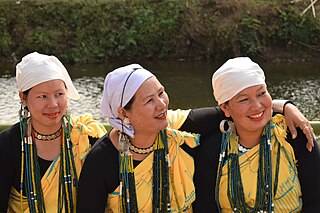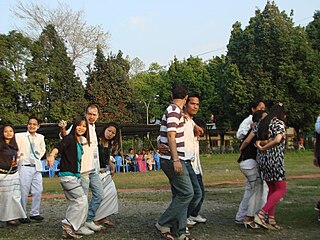Lhoba is any of a diverse amalgamation of Sino-Tibetan-speaking tribespeople living in and around Pemako, a region in southeastern Tibet including Mainling, Medog and Zayü counties of Nyingchi and Lhünzê County of Shannan, Tibet.

Arunachal Pradesh is a state in Northeastern India. It was formed from the erstwhile North-East Frontier Agency (NEFA) region, and became a state on 20 February 1987. It borders the states of Assam and Nagaland to the south. It shares international borders with Bhutan in the west, Myanmar in the east, and a disputed border with China in the north at the McMahon Line. Itanagar is the state capital of Arunachal Pradesh. Arunachal Pradesh is the largest of the Seven Sister States of Northeast India by area. Arunachal Pradesh shares a 1,129 km border with China's Tibet Autonomous Region.

Itanagar is the capital and largest town of the Indian state of Arunachal Pradesh. The seat of Arunachal Pradesh Legislative Assembly, the seat of government of Arunachal Pradesh, and the seat of Gauhati High Court permanent bench at Naharlagun are all in Itanagar. Being the hub of all the major economic bases, Itanagar along with the adjacent town of Naharlagun comprising the administrative region of Itanagar Capital Complex Region stretching from the Itanagar Municipal limit at Chandranagar Town extended till Nirjuli Town, is a major junction of Cultural, economic, fashion, education and recreational activities.

The Adi people are one of the most populous groups of indigenous peoples in the Indian state of Arunachal Pradesh. A few thousand are also found in the Tibet Autonomous Region, where they are called the Lhoba together with some of the Nishi people, Na people, Mishmi people and Tagin people.
The Indian state of Arunachal Pradesh has a total population of roughly 1.4 million on an area of 84,000 km2, amounting to a population density of about 17 pop./km2 . Much of Arunachal Pradesh is forested. The "indigenous groups" account for about two thirds of population, while immigrants, mostly of Bengali/Hindi belt origin, account for a third.

Donyi-Polo is the designation given to the indigenous religion, of animistic and shamanic type, of the Tani and other Tibeto-Burman peoples of Arunachal Pradesh and Assam in Northeast India. The name "Donyi-Polo" means "Sun-Moon", and was chosen for the religion in the process of its revitalisation and institutionalisation. The Donyi- Poloism has been there from since immemorial.

The Wancho are Naga indigenous people inhabiting the Patkai hills of Longding district in the Indian state of Arunachal Pradesh. Culturally Naga, they are ethnically related to the Nocte of Arunachal Pradesh and Konyak of Nagaland The Wancho and Konyak still today share similar names, Konyak is the largest tribe in Nagaland. Wancho's history is mostly based on present day Nagaland.Even today, There are villages in Wancho inhabited area in Arunachal and konyak inhabited Mon Nagaland with the same names for example Longkei village.. The Wancho language belongs to the Tibeto-Burman family under Northern Naga languages

West Siang is an administrative district in the state of Arunachal Pradesh in India.
Daporijo is a census town in the Upper Subansiri district, Indian state of Arunachal Pradesh in the Northeast of India.

Yingkiong is a town in and the administrative headquarters of Upper Siang district in the Northeast Indian state of Arunachal Pradesh. It is located 250 kilometres (160 mi) north of Itanagar, the capital of the state, and 1 kilometre (0.62 mi) east of the River Siang. According to the 2011 Census, the town has a total population of 8,573.

Aalo, formerly Along, is a census town and headquarter of the West Siang district district of the Indian state of Arunachal Pradesh. It is located 137 kilometres (85 mi) from Likabali, which is at the border of Assam and Arunachal Pradesh.

Pangsau Pass or Pan Saung Pass, 3,727 feet (1,136 m) in altitude, lies on the crest of the Patkai Hills on the India–Myanmar border. The pass offers one of the easiest routes into Burma from the Assam plains. It is named after the closest Burmese village, Pangsau, that lies 2 km beyond the pass to the east. To the east of Pangsau Pass, India's undisputed easternmost point "Chaukan Pass" lies and to the east of Vijaynagar in the Changlang district.

The Galo are a central Eastern Himalayan tribe, who are descendants of Abotani and speak the Tani Galo language. The Galo people primarily inhabit West Siang, Lepa Rada, and Lower Siang districts of modern-day Arunachal Pradesh state in northeastern India, but they are also found in the southwestern side of East Siang district, the southeastern side of Upper Subansiri district, as well as in some small pockets in Itanagar. Other names which have been used to reference the Galo in the past include Duba, Doba, Dobah Abor, Gallong Abor, Galong, Gallong Adi, etc. The Galo have been listed as a scheduled tribe under the name Gallong since 1950.
Basar is a census town in Lepa-Rada district in the state of Arunachal Pradesh, India. Basar is the abode of Galo people. Basar is subdivided into two zila segments. Basar is the headquarters of the Leparada District. It also has the Bascon festival. Basar has three rivers namely Kidi, Hii and Hiile.

The 'Mopin' or 'Moopin' Festival is an agricultural festival celebrated by the Galo tribe of Arunachal Pradesh, India in particular of the Galo group of tribes which resides in East Siang and West Siang districts. It is a celebration of the harvesting season held in the Galo months of "Lumi" and "Luki", corresponding to March–April and the new year for the Galo tribe. The Galo tribe follow an animist religion called Donyi-Polo.
Here is a list of glossary of Culture of India in alphabetical order:

Apo or Apong is an alcohol drink commonly found among the tribes in the Northeast India states of Arunachal Pradesh and Assam. It is prepared by fermentation of rice. It is known by various names across different tribes in Arunachal Pradesh and Assam.
Marriage Practices of Galo Tribe or Traditional Galo Tribe Wedding/Marriage Practices are part of the cultural fabric of Arunachal Pradesh, India. In Galo dialect, it is called as NYIDA.

Pakke-Kessang is a district located in the state of Arunachal Pradesh in the Northeast of India. The district used to be a part of the neighboring district, East Kameng, and was created out of its five southernmost administrative units: Pijerang, Passa Valley, Pakke-Kessang, Dissing Passo and Seijosa. The district headquarters of Pakke-Kessang is located at Lemmi.
Lepa Rada district, with headquarters at Basar, is one of the 25 districts of Arunachal Pradesh state in northeastern India. Lepa Rada falls under 29-Basar Assembly Constituency and 1-West Parliamentary Constituency. The district is centrally located, hence the name Lepa Rada. Basar, Tirbin, Dari and Sago are 4 administrative circles of the district. It was created from the West Siang district by bifurcating its southern areas along Assam border into a new district.













